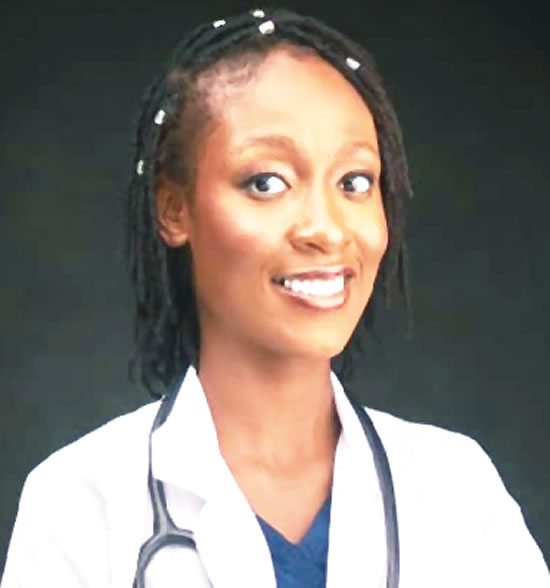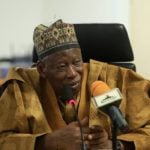Godknows Chiamaka Osarhiaekhimen is the 2022 best-graduating student of Medicine and Surgery of the Obafemi Awolowo University (OAU). She made distinctions in all her medical courses. In this interview by Kingsley Alumona, she speaks about her life and experience in OAU, the Nigerian health sector, among others.
AT what age/stage in your life were you sure you wanted to become a medical doctor?
This is a tough question. Honestly, I was guided into this profession by my dad. I can’t think of a particular point in my life where I decided on my own to become a doctor. I don’t regret it, though. I can’t imagine studying anything else, now. I find the medical field exciting. One could even say that Medicine called me.
Why did you decide to study medicine at Obafemi Awolowo University (OAU)? How were life and studentship at OAU?
I didn’t want to study at OAU, initially. I had another school in mind. However, my dad is an alumnus and he advised me to make OAU my first choice. I’m glad I finished from this great institution.
Life in OAU was a blend of various experiences. I got to meet people from various backgrounds and who had diverse experiences. I had friends whom I learnt a lot from and with whom I had a lot of fond memories. Of course, being a medical student, a lot of my friends graduated and left while I was in my fourth and fifth years. But it was a good run. There were good times and bad times, but they all helped to contribute to who I am today. I’m leaving OAU a more mature individual, and I’m thankful for the opportunity to be an alumnus of Great Ife.
In the course of your study, was there a time you wanted to quit or felt frustrated or regretted studying medicine or thought that education in Nigeria was not worth it? If so, how did you manage the situation?
There were times I felt frustrated, but it wasn’t enough to make me want to quit my studies. Medicine can be a really mentally draining course, and my advice to anyone who gets to that tipping point would be to relax, take a breather. If this doesn’t work out, it might be time to seek help from a counsellor or psychologist. I believe that one’s mental health must be protected.
I can understand why some people will think that education in Nigeria is not worth it. I mean, if one looks at the people who have “made it” in that sense of the word, the majority will not be highly educated. This doesn’t mean that education is not worth it. As youths, we should work on developing ourselves and not just rely solely on formal education to give us a soft landing in the society.
You are the best graduating student in your class. What does this mean to you? And how does your family feel about it?
I’m grateful for the accomplishment. I’m happy that I was able to make everyone who had a stake in my education proud. I believe that God’s favour is a major contributing factor. Other factors include my family, my network of friends, my colleagues and my lecturers. Little words of encouragement and prayers from these individuals went a long way in bringing me to this point. My family is ecstatic, especially my parents.
When you were in first year, what were your expectations/desires towards graduation? And, while in your first year, did you envisage becoming the best graduating student?
My expectations were to finish without any issues and to finish in six years. I didn’t envisage being the best graduating student in my first year. I didn’t plan to break the record of distinctions in all courses when I entered medical school. I just wanted to always do really well in all my exams. As I went on in medical school and began to have distinctions, I decided that I had to keep up the tempo.
You made distinctions in all your medical courses. How was this feat possible?
Diligence and consistency. I had a good support system − my relationship with God, my family, really good friends and the best lecturers in the world. My parents were very supportive in every respect. They ensured that, as much as lay in their power, I never lacked anything I needed. My friends were there for me, providing the much needed social support. My colleagues also wished me well. There were several of my colleagues who would tell me from time to time that they were rooting for me to be the best graduating student. All those gestures really went a long way in encouraging me to soldier on.
My lecturers ensured that we received quality medical education. There are a lot of lecturers who inspired me in medical school. In my pre-clinicals, Dr. Akomolafe, a lecturer in Physiology, was someone who encouraged me to aim higher, even though he might not be aware of this. I had a lot of awesome lecturers in my clinical. Worthy of note are Professor Oyelami, a lecturer in Paediatrics, who was like a grandfather figure to me; Dr. Ibidun Oloniniyi, a lecturer in Mental Health, who inspired me with the way she carried herself and was a shining example to us; Dr. Archibong, a consultant in Obstetrics and Gynaecology, who I got to learn a lot from; Dr. Ojo, a consultant in Cardiothoracic Surgery, who made surgery a little more interesting; Professor Afolabi, a consultant in Community Health, who supervised my project and ensured that we had a seamless experience; Dr. Nike Arawomo, a consultant in Respiratory Medicine, who inspired me with her gentle strength; Dr. Akinfaderin, a senior registrar in Cardiology, who supervised my case report and organised tutorials for us; and Dr. Idowu, a senior registrar in Neurology, who always took his time to ensure that we were well grounded in the art of clinical interactions with patients.
I could go on and on — because we have very good lecturers in the College of Health Sciences, Obafemi Awolowo University — but I will have to stop here.
Could you list all the courses you had distinctions in? Among the courses, which one did you love most and why?
I had distinctions in Anatomy, Biochemistry and Physiology in my 2nd and 3rd years; Pathology and Pharmacology in my fourth year; Obstetrics and Gynaecology, Paediatrics, Mental Health and Dermatology in my fifth year; Surgery, Medicine and Community health in my sixth year.
I loved Mental Health the most. It just came easy to me. The lecturers were also very friendly and I got to learn and interact with patients in a relaxed environment.
What was your social life like while on campus? Did you have boyfriend, party and club?
I wouldn’t describe myself as much of a socialite. I had friends and I got involved in nonacademic activities as well. I was part of a student-run organisation, AIESEC, for about five years. I joined in 2017. I’m also a church girl.
Many Nigerian medical doctors are travelling abroad to practice, causing a brain drain in the health sector. What can you say about this? And do you have plans of practicing medicine abroad?
Well, the health sector is poorly funded and frankly, I’ve seen firsthand how frustrating the system can be on my lecturers. However, travelling abroad to practice is not peculiar to Nigerian doctors alone. Doctors working in developed countries sometimes move to other countries for various reasons. I have a lot of plans for the future which will be unfolded as time goes by.
In the course of studying medicine and training in teaching hospitals, how would you rate President Muhammadu Buhari’s performance in the health sector? And how would you advise him if you think he needs advice?
I’m aware that the president has special advisers. What I’ll share is just my opinion as a student who trained in a federal teaching hospital. The health sector desperately needs rejuvenation. A lot needs to be done in terms of infrastructure. I think that instead of building new hospitals, the ones on ground should be fitted with the latest technology.
There should be a discussion on feasible health care financing in Nigeria as the average patient pays out of pocket for health care services and this is quite a strain. Sometimes, patients are not able to get the care that is appropriate for their condition because they can’t afford it.
A lot of processes also need to be automated to reduce patient waiting time and unnecessary running around. Instead of manual health records, we should keep with the times and use electronic health records. A lot needs to be done so we can have an enviable health system.
What is your advice for students, especially the female ones, who are aspiring to achieve the same academic feat like you?
My advice is that one can never aim too high. Have lofty ambitions, and don’t be afraid to chase your dreams. Anything is possible. And please, don’t ever compare yourself to anyone. Embrace your uniqueness. This is not to say you can’t learn from others, but don’t ever feel the need to draw parallels. As a female, don’t carry the preconceived notion that the world is biased against you. If you’re willing to put in the work needed, you’ll get the result you desire.
ALSO READ FROM NIGERIAN TRIBUNE
- Alaafin: Interview For 86 Contestants Begins Monday
- Reasons Multitasking May Not Be Good For You
- Customs DG Faults N6trn Fuel Subsidy
- 2023: Northern Votes Will Make An Impact — NEF
- Seven Things You Should Put In Your CV
- EDITORIAL: UN’s Alarm On Starvation Of Children In Nigeria
WATCH TOP VIDEOS FROM NIGERIAN TRIBUNE TV
- Let’s Talk About SELF-AWARENESS
- Is Your Confidence Mistaken for Pride? Let’s talk about it
- Is Etiquette About Perfection…Or Just Not Being Rude?
- Top Psychologist Reveal 3 Signs You’re Struggling With Imposter Syndrome
- Do You Pick Up Work-Related Calls at Midnight or Never? Let’s Talk About Boundaries






